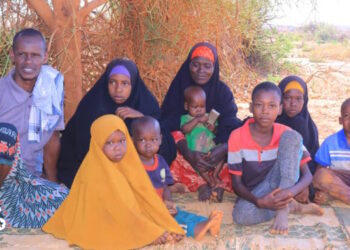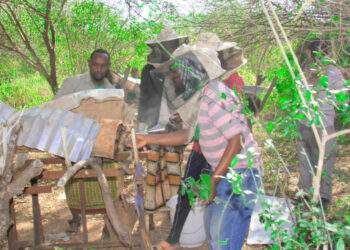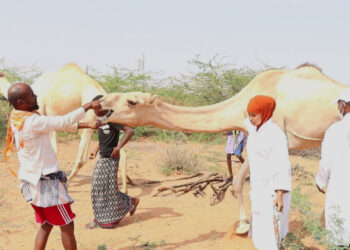(ERGO) – A farming community in a remote valley east of Lasanod in northern Somalia’s Sool region is facing crisis, after a combination of drought and crop pests destroyed their harvests, leaving them penniless.
The farmers in Ooda-gooye say pests invaded their farms in August, at the same time that water became scarce. The onions, tomatoes, peppers, watermelon, carrots, and cucumbers that had been planted in June with the expectation of harvesting at the end of August were all destroyed.
One of the farmers, Samsam Ahmed Mohamed, told Radio Ergo that she couldn’t get credit for food from local shops because of the debt of $240 that she failed to pay back due to lack of income from the harvest.
“Life for my family has become very hard. I cook once a day, either in the morning or at noon. Our lives depended on the farm, and now there’s nothing left. Pests and drought struck us together, and we have no other way to survive,” she said.
“They [local businessmen] told me to repay what I already owe before they give me anything new. It has broken my heart because I have no other way to feed my children.”
She can’t afford to buy water priced at 50 cents per jerrycan, so asks the donkey cart supplier to allow her to take one jerrycan a day that she will refund as soon as she can.
After the farm failed, Samsam considered moving to Lasanod town to find other income, but a rented room would cost $50 a month. There is no money to improve the small hut they live in, where the young children sleep inside and she and the older children camp outside.
“Our home is just a small shelter made of sticks and cloth, without a door. It stands in the middle of the farm. We couldn’t afford to build even a small iron-sheet room,” said Samsam.
“I invested $1,200 in seeds and labour for the farm, but nothing came back. I had hoped to recover the money and make some profit, but I lost everything. Now I’m left with debt and no income.”
Samsam’s family turned to farming and moved to Ooda-gooye in 2023, after losing 30 goats to drought and disease in their former home of Tukaraq, eastern Sool. Her husband, who once helped her on the five-hectare farm, has been bedridden since then with diabetes and high blood pressure.
Furthermore, the village has no school. Samsam’s four school aged children are not being educated as she cannot afford the $15 fees per child at schools in Lasanod, 15 kilometres away.
Fatuuh Mohamed Asoowe has suffered similar losses in Ooda-gooye, where she has farmed for 10 years. She planted onions, tomatoes, and carrots on her seven-hectare farm in June, but everything was destroyed by pests and lack of water.
The mother of eight, who also cares for her nine grandchildren, said her family faces hunger and debt.
“The yield we expected dropped sharply. We now cook only twice a day at most. Our family relied entirely on the farm, and now we have nothing. Sometimes we eat, sometimes we don’t,” she said.
Fatuuh said the pesticides she bought on credit for $150 failed to stop the pests from doing so much damage.
Her husband left early in August for Gambadhe village, near Lasanod, with their 13 goats hoping to find pasture, but couldn’t find much fodder or water due to the drought.
Fatuuh’s sister helped her out with the $100 rent last month for the two small rooms they occupy. Three of her children have dropped out of school in Lasanod because she could not pay the $90 fees for the past two months. Her total debt stands at $2,000, covering farm inputs, pesticides, fuel, and rent.
The head of the farmers’ group in the area, Farhiya Ahmed Ise, said the 60 farmers Ooda-gooye needed urgent support to prevent their livelihoods from collapsing completely.
The pest infestations were intense, and wild animals, including warthogs, monkeys, and rabbits, have raided the field eating what is left.
“We have not received any help from the government or aid agencies, and we are poor people with very limited means. We need quality pesticides, fencing wire for the farms, wells, and water storage for the rainy season, and training to improve our farming knowledge,” she told Radio Ergo.
Farhiya said that lack of knowledge and skills among the farmers was a major problem as they received no guidance. There are no wells in the area, and when rain arrives the water passes through the water without being collected and stored.











